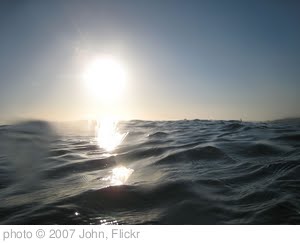 An account in The New York Times by Ethan Bronner reports that Israeli women and West Bank Palestinian women and girls have once again broken Israeli laws. They have gone swimming in the Mediterranean Sea.
An account in The New York Times by Ethan Bronner reports that Israeli women and West Bank Palestinian women and girls have once again broken Israeli laws. They have gone swimming in the Mediterranean Sea.
More than two dozen Israeli women invited Palestinian women and girls from the southern part of the West Bank of the Jordan River -- who are not normally allowed into Israel and have no access to the sea -- to go swimming with them. Under Israeli military occupation since 1967, according to Bronner, "most had never seen the sea before."
The theoretician Gene Sharp, in his landmark three-volume trilogy The Politics of Nonviolent Action, identified 198 different methods historically employed by nonviolent campaigns, and he listed the wade-in among them: number 165.
Bronner quotes one of the participants of the swim, Hagit Aharoni, an Israeli psychotherapist:
For 44 years, we have occupied another country. I am 53, which means most of my life I have been an occupier. I don't want to be an occupier. I am engaged in an illegal act of disobedience. I am not Rosa Parks, but I admire her, because she had the courage to break a law that was not right.
Rosa Parks was a seamstress, active in the National Association for the Advancement of Colored People, who was arrested on December 1, 1955, for refusing to yield her seat on a public conveyance to a white man. The Women's Political Council in the black community had been discussing boycotting as a means of resistance against the racial segregation on the city buses for some time. Jo Ann Robinson, a leader in the council since 1950, worked through the night to organize this action of economic noncooperation. The leadership for the action shifted almost immediately from the women's council to the churches. The Reverend Martin Luther King, Jr., was elected unanimously to lead the Montgomery Improvement Association, a new group to guide the boycott, which lasted for 381 days.
The target in Montgomery was one city's bus system. But the boycott's success -- acknowledged when the Supreme Court ruled on November 13, 1956, that local laws requiring segregation on buses were unconstitutional -- lifted hopes for similar abolition of other discriminatory practices in the South. Remembered for the unity of the city's black populace during painstaking civil resistance, the boycott set the parameters of strategic nonviolent action for the civil rights movement as a whole, which within one decade would break down the legal supports for the racial caste system of the United States.
Had we not heard of Rosa Parks, we may never have heard of King, who had recently arrived in Montgomery to take up his ministry. And Hagit Aharoni and other Israeli women, who created a group they call We Will Not Obey, might not have taken Palestinians for a swim.
Israeli women's nonviolent activism is rich in bearing witness, offering leadership, leading mobilization, challenging laws, and -- now -- swimming in civil disobedience. One Israeli women's group has become an international movement. Women in Black started in West Jerusalem in January 1988, a month after the start of the 1987 Intifada, when a small group of women began carrying out a simple nonviolent method: denunciation. Condemning the military occupation, and opposing the use of excessive force by Israeli troops against the young Palestinians who protest it, they have held small weekly vigils on Fridays at lunchtime near the prime minister's residence, at a busy five-way intersection. Wearing black to convey mourning, they have silently held placards opposing their government's policy: "Dai L'Kibbush," or "Down with the Occupation!"
Some participants say they were inspired by Las Madres de la Plaza de Mayo (the Mothers of Mayo Plaza), who marched weekly in Argentina's capital between 1977 and 1983, seeking information and acknowledgment that their children had been "disappeared" by the military generals in their dirty war. Others point to the South African women's Black Sash Movement. The idea spread rapidly and spontaneously to other parts of the world. In 2006, one study counted 360 groups named for Women in Black, a worldwide "network of women committed to peace with justice," according to their website.
As Israeli scholar Tamar Hermann has shown in her essay, "Winning the Mainstream: Arba Imahot, the Four Mothers Movement in Israel," in Maria J. Stephan's book, Civilian Jihad: Nonviolent Struggle, Democratization, and Governance in the Middle East (2009), the movement's strategy had to be strictly nonviolent in order for it to have maximal inclusivity and generate positive news coverage. Named for four mothers whose sons were serving in elite units of the Israel Defense Forces (IDF) in Lebanon, it used vigils and petitions to win tens of thousands of supporters, as it put its points across to politicians. The movement is widely credited with generating the pressure on the Israeli government to withdraw the IDF from Lebanon in June 2000. Hermann considers it "the most successful grassroots organization in Israeli's history."
Often the first step in addressing a grievance is to force an issue out into the open. In withdrawing their cooperation from their government's military occupation by wading into the sea, Israeli women have once again exerted social power, with creativity and imagination.
[This article appears courtesy of a partnership with Waging Nonviolence.]
Mary Elizabeth King is professor of peace and conflict studies at the U.N.-affiliated University for Peace and a Rothermere American Institute Fellow at the University of Oxford, in Britain. She is the author of A Quiet Revolution, Freedom Song and Mahatma Gandhi and Martin Luther King Jr. During the U.S. civil rights movement, she worked alongside Martin Luther King, Jr. (no relation), in the Student Nonviolent Coordinating Committee.
Got something to say about what you're reading? We value your feedback!